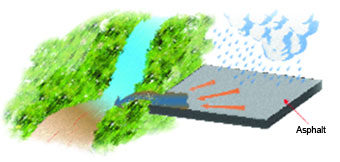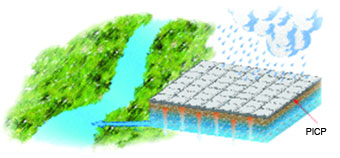Stormwater Design / Rainwater Management (2)
Reduce runoff volume and improve water quality, replicating natural hydrology of the site.
- Reduces TSS and TP
- Filters and cools runoff
| CalGreen | 5.106.1; A5.106 |
| CHPS | SS 5.1: 2 pts. |
| GGlobes | 2.4.1.1.1: 3pts., 2.4.1.1.2: 1 pt., 2.4.1.1.3: 1 pt., 2.1.1.1.4: 1 pt., 2.4.1.1.5: 1 pt. |
| BDCv4 | SS Rainwater management: up to 3 pts. |
| BDCv4.1 | SS Rainwater Management: up to 3 pts. |
| NDv4 | GIB Rainwater Management: up to 4 pts. |
| SITES | SD-W Manage precipitation on site: Req, 3.3 4-6 pts. |
| Applicable Products / Systems |
|
Quality control: PICP act as a buffer between developed areas and the surrounding natural environment. PICP filter out significant portions of contaminants – including oil drippings – as well as cooling the temperature of the runoff, mitigating potential damage to sensitive flora and fauna.
Since PICP reduce runoff through infiltration, it has the ability to reduce TSS (total suspended solids) and TP (total phosphates). Several studies have demonstrated 80% reduction of TSS and at least 40% TP reduction. These studies compared reductions in pollutants from PICP to that from impervious pavements.
The ability of PICP to reduce these pollutants is typically greater than these percentages according to references in the Interlocking Concrete Pavement Institute's manual, Permeable Interlocking Concrete Pavements (Fifth Edition) - Selection, Design, Construction, Maintenance. The ICPI manual references studies on permeable pavements with reductions in TSS and TP as high as 95%.


For more information visit Angelus Pavers & Walls
 Stormwater Design / Rainwater Management
Stormwater Design / Rainwater Management

